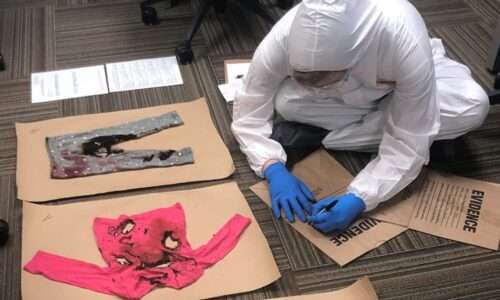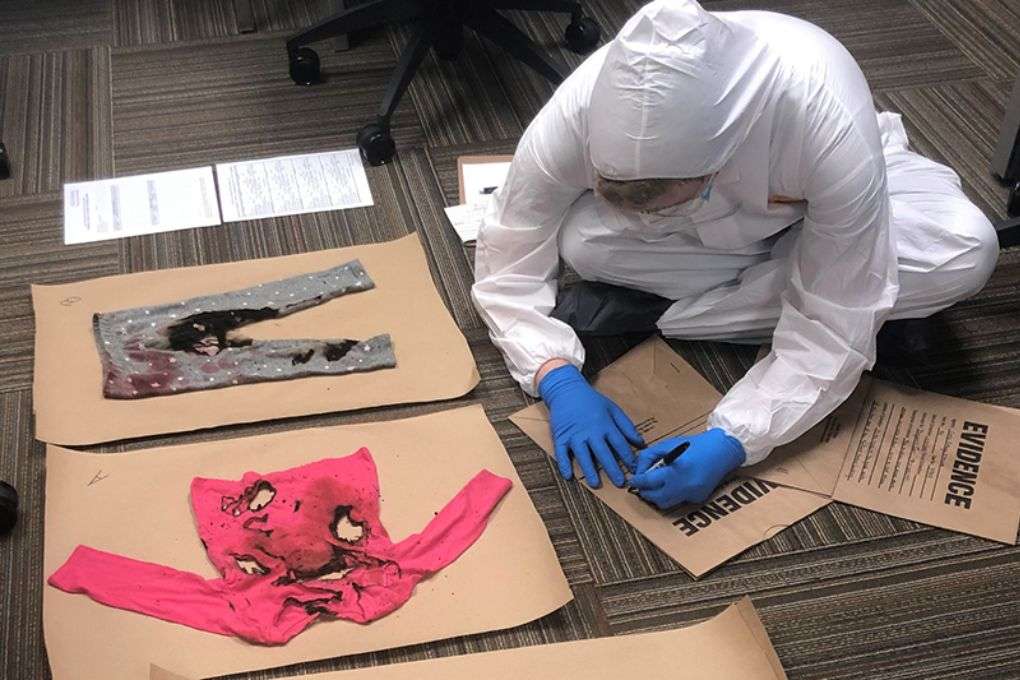Mohammed Abdurahiman Memorial Orphanage College- Forensic Science – June 2nd weekCopy
Overview Forensic science is the application of scientific principles and techniques to analyze physical evidence in criminal investigations. It involves the use of various scientific methods and technologies to examine and interpret evidence found at crime scenes, such as DNA samples, fingerprints, bloodstains, fibers, and other trace materials. Forensic science …
Overview
Forensic science is the application of scientific principles and techniques to analyze physical evidence in criminal investigations. It involves the use of various scientific methods and technologies to examine and interpret evidence found at crime scenes, such as DNA samples, fingerprints, bloodstains, fibers, and other trace materials. Forensic science plays a critical role in the criminal justice system, helping to identify and convict criminals, exonerate innocent individuals, and provide closure for victims and their families.
A forensic science course typically covers a range of topics, including crime scene investigation, forensic biology, forensic chemistry, forensic psychology, and forensic anthropology. Students may learn how to collect and analyze evidence, interpret findings, and present their conclusions in a court of law. They may also study ethical issues related to forensic science, such as the reliability of certain techniques and the potential for bias or error in the analysis of evidence. Graduates of a forensic science course may pursue careers as forensic scientists, crime scene investigators, or forensic analysts in law enforcement agencies, laboratories, or other related fields.
Benefits of Learning
Learning forensic science can provide a range of benefits, including:
- In-demand skills: Forensic science is a growing field that is in high demand, and there are many job opportunities available for those with the right skills and training.
- Contributing to society: Forensic science is an important tool in the criminal justice system, and those who work in this field have the opportunity to make a real difference in people’s lives by helping to solve crimes and bring criminals to justice.
- Intellectual stimulation: Forensic science is a multidisciplinary field that involves elements of biology, chemistry, physics, psychology, and other sciences. Learning about forensic science can be intellectually stimulating and challenging, and can help you develop a range of analytical and problem-solving skills.
- Career advancement: If you are already working in law enforcement or a related field, learning forensic science can help you advance your career by giving you specialized knowledge and skills that are highly valued in the field.
- Personal satisfaction: For those who are passionate about science and justice, learning forensic science can be personally fulfilling and rewarding, as it allows you to apply your skills and knowledge to help others and make a difference in the world.
Overall, learning forensic science can provide a range of benefits, from intellectual stimulation and personal satisfaction to career advancement and the opportunity to contribute to society.
Who can Learn
Forensic science courses are typically open to anyone who meets the prerequisites and has an interest in the field. Depending on the level and type of course, the prerequisites may include a high school diploma or equivalent, basic knowledge of math and science, and sometimes prior coursework in biology, chemistry, or physics.
Forensic science courses are often taken by students who are interested in pursuing a career in law enforcement or a related field, such as forensic science, criminology, or criminal justice. However, the courses can also be beneficial for professionals who are already working in these fields, such as police officers, crime scene investigators, or attorneys.
In addition, forensic science courses can be of interest to individuals who are simply curious about the field and want to learn more about the scientific methods and techniques used in criminal investigations.
Overall, forensic science courses can be valuable for anyone who wants to develop their knowledge and skills in this field, regardless of their background or career goals.
Career Scope
There are a wide range of career opportunities available to individuals who have completed a forensic science course, including:
- Forensic scientist: Forensic scientists work in crime labs and analyze physical evidence to help solve crimes. They may specialize in a particular area, such as DNA analysis, ballistics, or toxicology.
- Crime scene investigator: Crime scene investigators are responsible for collecting and analyzing evidence at crime scenes. They may also work with forensic scientists to ensure that evidence is properly processed and analyzed.
- Forensic accountant: Forensic accountants use accounting and auditing skills to investigate financial crimes, such as fraud and embezzlement.
- Forensic psychologist: Forensic psychologists apply their knowledge of psychology to criminal investigations, working with law enforcement to analyze the behavior of suspects and witnesses.
- Digital forensic analyst: Digital forensic analysts specialize in recovering and analyzing data from electronic devices, such as computers and smartphones, to help solve crimes.
- Forensic anthropologist: Forensic anthropologists study human remains to determine the cause of death and other important information for criminal investigations.
- Forensic pathologist: Forensic pathologists are medical doctors who specialize in determining the cause of death in cases involving violence, trauma, or other suspicious circumstances.
- Criminal investigator: Criminal investigators work for law enforcement agencies and are responsible for investigating crimes, gathering evidence, and making arrests.
Overall, completing a forensic science course can open up a wide range of career opportunities in the criminal justice and forensic science fields.
Salary Package with Job Role In India and Foreign
The salary package for forensic science professionals can vary depending on the job role, level of experience, and location. Here is a general overview of the salary ranges for some common job roles in India and abroad:
- Forensic Scientist: In India, the salary of a forensic scientist can range from INR 2.5 lakh to INR 10 lakh per annum depending on the experience and expertise. In the USA, the average salary of a forensic scientist is around $61,000 to $90,000 per year.
- Crime Scene Investigator: In India, the salary of a crime scene investigator can range from INR 2 lakh to INR 7 lakh per annum depending on the experience and expertise. In the USA, the average salary of a crime scene investigator is around $46,000 to $70,000 per year.
- Digital Forensic Analyst: In India, the salary of a digital forensic analyst can range from INR 3 lakh to INR 12 lakh per annum depending on the experience and expertise. In the USA, the average salary of a digital forensic analyst is around $56,000 to $103,000 per year.
- Forensic Accountant: In India, the salary of a forensic accountant can range from INR 3 lakh to INR 15 lakh per annum depending on the experience and expertise. In the USA, the average salary of a forensic accountant is around $60,000 to $100,000 per year.
- Forensic Psychologist: In India, the salary of a forensic psychologist can range from INR 3 lakh to INR 12 lakh per annum depending on the experience and expertise. In the USA, the average salary of a forensic psychologist is around $64,000 to $109,000 per year.
It’s worth noting that salaries can also vary depending on the organization and sector in which a professional is working. Overall, forensic science professionals can earn competitive salaries in India and abroad, with the potential for career growth and advancement.
Requirements To Study
The specific requirements for studying forensic science can vary depending on the institution and program. Here are some general requirements to keep in mind:
- Education: To study forensic science, you will typically need a high school diploma or equivalent. Some programs may also require prior coursework in science, such as biology, chemistry, or physics.
- Prerequisites: Some forensic science programs may have specific prerequisite courses that you must complete before being admitted to the program. These prerequisites may include courses in math, science, or other related subjects.
- Entrance exams: Some programs may require you to take entrance exams, such as the Graduate Record Examination (GRE) or the Law School Admission Test (LSAT), depending on the level and type of program.
- Language proficiency: If you are applying to a program in a country where the language of instruction is not your native language, you may be required to demonstrate proficiency in that language through tests such as the TOEFL or IELTS.
- Personal qualities: Successful forensic scientists possess strong analytical and problem-solving skills, attention to detail, and the ability to work well under pressure. Some programs may require interviews or personal statements to assess your suitability for the field.
Overall, the specific requirements for studying forensic science will depend on the institution and program you are applying to. It is important to research the requirements carefully and ensure that you meet them before applying.
Key Features
Forensic science courses can have a range of key features that make them unique and valuable for students interested in this field. Here are some of the key features of a forensic science course:
- Interdisciplinary approach: Forensic science is an interdisciplinary field that draws on knowledge and techniques from various scientific disciplines, including biology, chemistry, physics, and mathematics. A forensic science course will typically provide an integrated approach that combines these disciplines to help students understand how forensic evidence is collected, analyzed, and used in criminal investigations.
- Hands-on training: Many forensic science courses provide hands-on training that allows students to gain practical experience in collecting and analyzing evidence. This may include laboratory work, crime scene investigations, and mock trials.
- Specializations: Forensic science covers a broad range of topics and specializations. A forensic science course may allow students to specialize in specific areas such as forensic biology, forensic chemistry, forensic anthropology, or digital forensics.
- Legal and ethical issues: Forensic science plays a crucial role in criminal investigations and the justice system. A forensic science course may cover legal and ethical issues related to collecting and analyzing evidence, including issues of privacy, confidentiality, and the admissibility of evidence in court.
- Advanced technologies: The field of forensic science is constantly evolving, and new technologies and techniques are continually being developed. A forensic science course may provide students with the opportunity to learn about cutting-edge technologies such as DNA analysis, toxicology screening, and digital forensics.
- Career preparation: A forensic science course can provide students with the knowledge and skills needed for a wide range of careers in the field, including forensic scientist, crime scene investigator, digital forensic analyst, and more. Some programs may also offer career development resources such as internships, job placement assistance, and networking opportunities.
Overall, a forensic science course can provide students with a comprehensive understanding of the field and prepare them for a rewarding career in the criminal justice and forensic science fields.
Instructor
Requirements
- To study forensic science, you will typically need a high school diploma or equivalent. Some programs may also require prior coursework in science, such as biology, chemistry, or physics.
- Some forensic science programs may have specific prerequisite courses that you must complete before being admitted to the program. These prerequisites may include courses in math, science, or other related subjects.
Features
- Interdisciplinary Approach
- Hands-on Training
- Easy to learn
- Certification
Target audiences
- Anyone who is interested
- Forensic science courses are typically open to anyone who meets the prerequisites and has an interest in the field.






